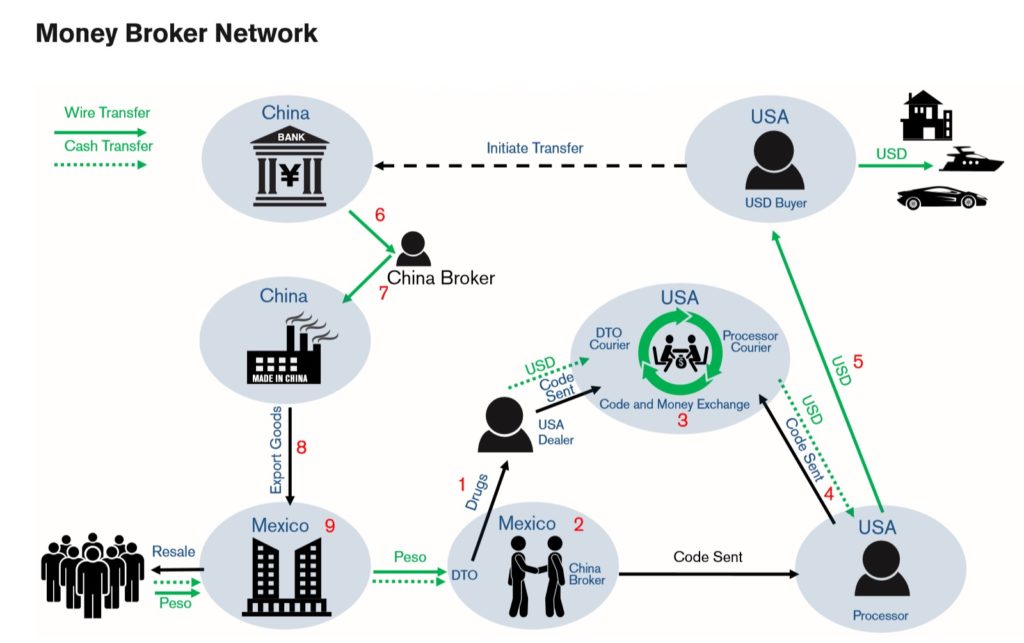February 6, 2020 – US Warns of Chinese Money Brokers Integrating Illicit Cash Proceeds through Trade Based Money Laundering, or TBML
On February 6, 2020, the Treasury Department released its 2020 National Strategy for Combating Terrorist and Other Illicit Financing. 2020 National Strategy. Among other threats to the US financial system were Chinese money laundering networks, or money brokers, described at pages 24 and 25 of the Strategy …
U.S. law enforcement has seen an increase in complex schemes to launder proceeds from the sale of illegal narcotics in the United States by facilitating the exchange of cash proceeds from Mexican drug trafficking organizations to Chinese citizens residing in the United States. These money laundering schemes, run by Professional Money Laundering Networks, or PMLNs, are designed to sidestep two separate obstacles: Drug Trafficking Organizations’ (DTOs’) inability to repatriate drug proceeds into the Mexican banking system due to dollar deposit restrictions imposed by Mexico in 2010 [of $4,000 a month per individual and $1,500 a month for U.S. currency exchanges by non-accountholders] and Chinese capital flight law restrictions on Chinese citizens located in the United States that prevent them from transferring the equivalent of US$50,000 held in Chinese bank accounts for use abroad. Chinese money laundering networks facilitate the transfer of cash between these two groups.
As described in the graphic from the Strategy [below], a variety of Chinese money brokers, processors and money couriers facilitate these PMLNs. Brokers in Mexico coordinate with DTOs in order for the DTOs to receive pesos in exchange for drug profits earned in the United States. The DTO instructs a courier in the United States to provide U.S. currency to the broker’s U.S. processor. The processor then launders the cash and identifies U.S.-based buyers. In exchange for U.S. currency, the buyer will transfer renminbi (RMB) through their Chinese bank account to a Chinese account controlled by the money broker. The broker then uses the RMB to buy commodities from a Chinese manufacturer for export to Mexico. Once the goods arrive in Mexico, the broker or the DTO completes the cycle by selling the goods locally for pesos.”
February 3, 2020 – Owners of Underground, International Financial Institutions Plead Guilty to Operating Unlicensed Money Transmitting Business
The First Chinese Money Broker Prosecution? On February 3, 2020 – three days before the 2020 National Strategy was released, the US Attorney for the Southern District of California issued a press release that announced that Bing Han and Lei Zhang pleaded guilty in federal court for operating unlicensed money transmitting businesses. The US Attorney noted that the guilty pleas “are believed to be the first in the United States for a developing form of unlawful underground financial institution that transfers money between the United States and China, thereby circumventing domestic and foreign laws regarding monetary transfers and reporting, including United States anti-money laundering scrutiny and Chinese capital flight controls.”
The press release described the scheme as admitted in the plea agreements (which are not available online) as follows:
“Han and Zhang would collect U.S. dollars (in cash) from various third-parties in the United States and deliver that cash to a customer, typically a gambler from China who could not readily access cash in the United States due to capital controls that limit the amount of Chinese yuan an individual can convert to foreign currency at $50,000 per year. Upon receipt of the U.S. dollars, the customer (i.e., the gambler) would transfer the equivalent value of yuan (using banking apps on their cell phones in the United States) from the customer’s Chinese bank account to a Chinese bank account designated by defendant Han or Zhang. For facilitating these transactions, Zhang and Han were paid a commission based on the monetary value illegally transferred … Han and Zhang further admitted that they were regularly introduced to customers by casino hosts, who sought to increase the gambling play of the casino’s customers. By connecting cash-starved gamblers in the United States with illicit money transmitting businesses, like those operated by Han and Zhang, the casinos increased the domestic cash play of their China-based customers. All a gambler needed was a mobile device that had remote access a China-based bank account. As a result, Han and Zhang managed to transmit and convert electronic funds in China into hard currency in the United States; all while circumventing the obstacles imposed both by China’s capital controls, and the anti-money laundering scrutiny imposed on all United States financial institutions. For their efforts, the casino hosts often received a cut of Han’s or Zhang’s commission.”
This sounds very similar to what was described in the 2020 National Strategy document. AML professionals should put a reminder in their calendars for the sentencing hearings of Han and Zhang in order to learn more about these “Chinese Money Broker” crimes that pose a threat to the US financial system.
US v. Bing Han, SD CA Case 20CR00369 is scheduled for sentencing on May 1, 2020.
US v. Lei Zhang, SD CA Case 20CR00370 is scheduled for sentencing on May 4, 2020.

